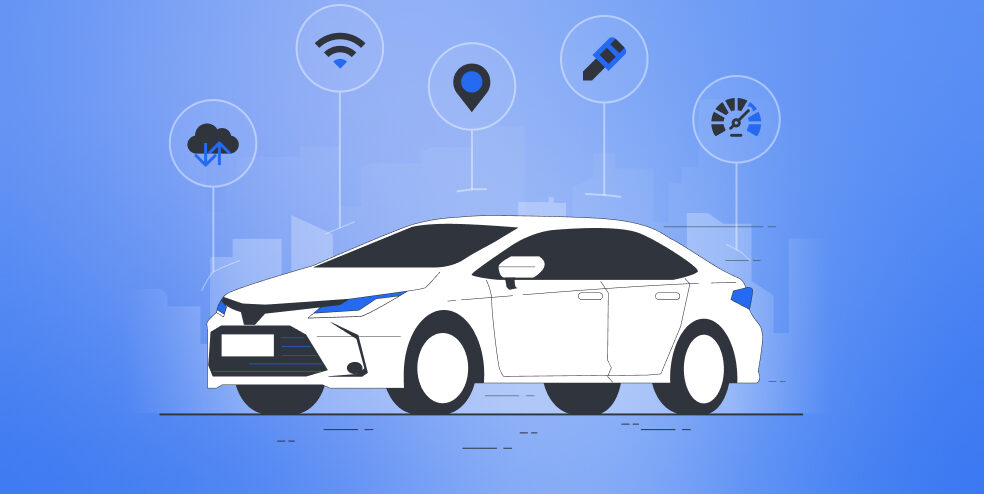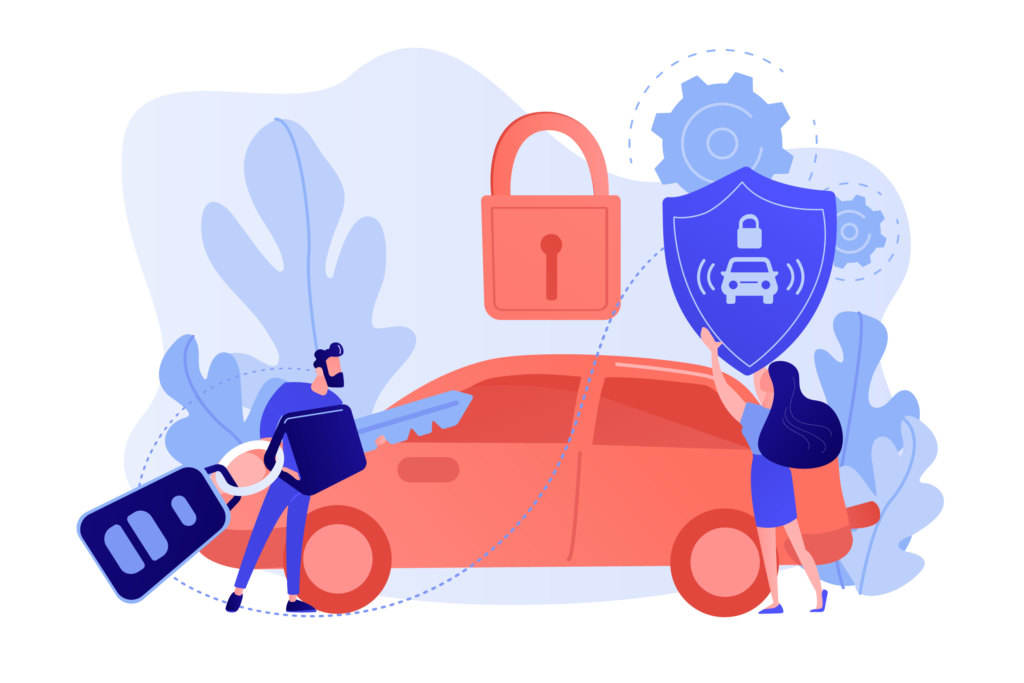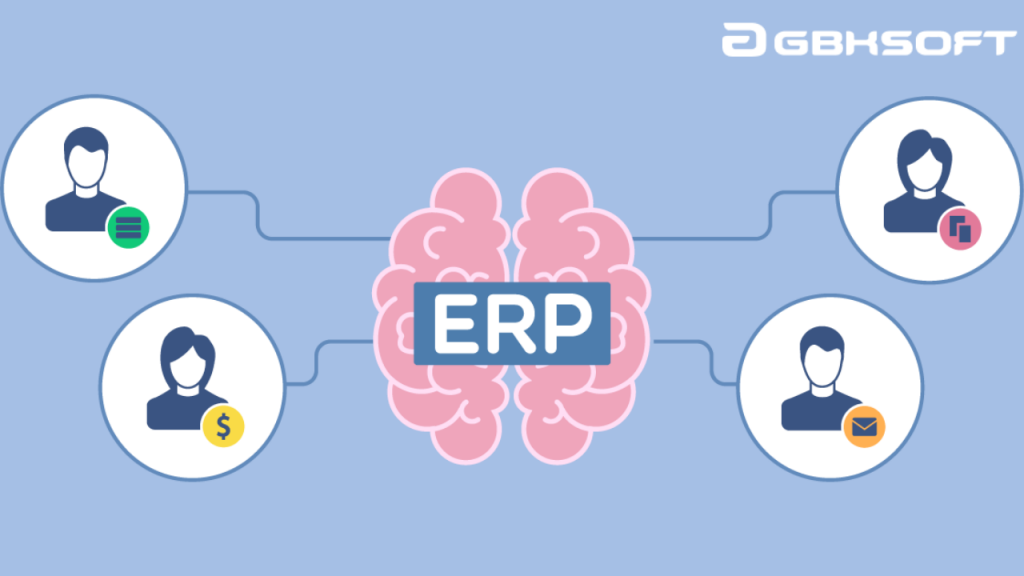Table of Contents
Industry titans announced that future market differentiators would be software-driven product and service innovations. The modern automotive market lacks sufficient software solutions and capabilities, thus undergoing major risks. Sufficient IoT automotive software engineering solutions allow to overcome the possible risks like hack attacks, cope with major challenges as well as beat the competitors and occupy leading positions within the industry, offering far more innovative products much faster to the market. So what basically is automotive software and how can it contribute to your business performance?
Automotive software is designed to transform and support the experience of operating a motor vehicle, including cars, ships, vehicles, and aircraft industry etc. The industry keeps up with the global digitalization and starts to finally evaluate and benefit from the importance of data and vehicle operation. All the internal systems including engine systems and central consoles undergo redesign. The main achievements of the latest car software development comprise streamlined key entry, ease of use, fuel efficiency, entertainment, pleasant and comfortable driving experience, and safety.
In this article, we will tackle the key issues concerning automotive software engineering, including the most interesting and useful insights.
Accelerate digital transformation for all industry players with automotive embedded software development
What is automotive software engineering?
The modern world demands that all industry players be more agile in detecting emerging trends, overcoming challenges and rapid changes as well as implementing development strategies. Automotive software engineering is transforming the future. It has entered the industry as a tremendous breakthrough, giving room for innovation and great opportunities to develop and grow, helping to survive in the severe and difficult market of today’s world. The following question then arises: “Will you transform the industry fast enough, or will you lose future revenues to incoming upstart disruptors?” and the answer was pretty obvious.
Over the recent years, thanks to software engineers, the automotive industry has undergone rapid transformation. Electric cars, shared mobility, autonomous driving, connectivity, in-vehicle payments, and more features are widely accessible due to automotive software development services. The overall goal of car software development is an enhancement of car safety, making transport more predictive and intuitive, as well as improving the driving experience. Consumer-oriented innovations and car software engineers are rapidly transforming automotive embedded software development. However, in the future, there will arise a necessity to connect all the cars or vehicles as well as jets and tune the regular upgrade and update processes. That is where sufficient automotive software engineering technology steps in.
By 2030, the software developers will see large changes — both in technologies and business models:
Vehicle software development offers a variety of opportunities exactly for your business.
What opportunities the automotive software engineering offers for your needs:
- satisfy the dynamic expectations of the customer
- deploy new functionality
- ensure the transport reliability through high quality software
- fit the quality requirements due to appropriate in-depth testing
- predictive diagnosis and fleet management and remote measurement
- provides secure access to vehicle data from anywhere
- enables remote firmware updates
- vehicle tracking software development
- automotive navigation software development satisfies the needs of EV drivers
Rational implementation of AI and ML techniques in automotive development services can generate savings for both OEMs and Tier 1. Below you can see the bright examples of automotive IT implementation and evaluate the contribution of the technology to everyday convenience:
| In-car Functions | Cross-vehicle Functions | Aircraft industry |
| Adaptive cruise control | Cooperative driver assistance systems | Autopilot safety mode |
| ABS and ESC | Self-driving vehicles | Computerized diagnostics |
| Seat belt tighten systems before the crash | Communication with other cars, travel apps, maps, traffic signals, and a host of sensors and devices | Distress buttons |
| Adaptive chassis control steering systems | Autonomous driving | Forward-facing radar |
| Integrated safety | Vehicle motion control | Ultrasonic sensors |
| Electric mobility | Lane departure detection |
Automotive solutions are as well widely applicable within the aircraft industry. It assists greatly in designing the software to implement, enhance and update the software for the jets of the future, flying cars, and ultra-modern helicopters.
As a rule, there are two main categories used while building automotive software — embedded software clients in cars plus software-as-a-service (SaaS) platforms that are delivered via cloud software platforms. The software client platforms dominate in the current field, but SaaS platforms are the solution of the future since they have started to rapidly spread and develop.
Shifting focus from hardware to software towards the future. Major challenges and custom built solutions
Automotive software engineering is a link between software applications and the hardware components of a vehicle. There is no single chip or system that can be supported either by the software or hardware, which is able to serve all required use models and user requirements for verification.
Interesting fact: These chips can store and process the same volumes of data as PCs do and work the same as computers do.
It is only possible with the complex approach. Virtual prototypes enable car software development based on transaction-level models of the hardware. For RTL execution, users can use simulation, emulation, and FPGA-based prototyping before the actual chip is available. Even globally, technology directly influences time to market from the unit level to the system level. Soon, the technology will be driven more by software than mechanics.
We are currently living in the age of the biggest technology transformation of all time. With the rapid pace of innovation, automotive mobility and web solutions also undergo a redesign, and software engineers are facing a variety of challenges. Here is the list of the most widespread challenges and the solutions powered by automotive software engineering:
- Electrification challenge – the biggest problem here lies in budgeting, range anxiety, performance, and safety. Technology helps to create batteries with the higher power, and elaborate on the way to design an integrated, effective electric powertrain system
- ADAS and autonomous vehicles challenge – technology helps to test the safety level while driving long distances by modeling all the possible scenarios and building the solutions that guarantee the highest level of safety.
- Connectivity- when it comes to connectivity, it is of the utmost importance to concentrate on better chip analysis and design, as well as on the communication factor to improve the power of the signal and optical integrity to allow connectivity within large distances.
The ability to cope with challenges like these gives businesses an edge over their competitors, allowing to avoid risks like start-of-production (SOP) delays and unpredicted large expenditures. Being invulnerable to customer safety risks and having the weapon to overcome the challenges, businesses can occupy leading positions and beat out competitors with minimum effort involved. However, there is no better option here than the custom-built car software development solutions since:
- Custom-built technology is always unique and maximally fits the client’s business needs.
- Safety risks are driven to the minimum since you get an individual software solution
- Wiser budgeting, since you invest once and the technology belongs to you
- You get a consistent solution for the entire vehicle lifecycle
- You get continuous tech support and consultation regarding any questions
Pioneer the new wave of smart automotive technology solutions with Altamira
Altamira has profound experience in technology, positioning it well to provide much needed solid support for your business utilizing the latest methodologies. Our projects are always based on in-depth market niche analysis performed during the discovery stage. Having gained experience in the delivery of automotive software for automotive aircraft and vehicle tech purposes, we adopt advanced practical skills implementing the best and most efficient automotive software engineering practices. Our team offers custom-built solutions for various industries, building the latest technology to satisfy your individual business needs.
Benefits of custom built technology by Altamira:
- Security (pile-time assurance, runtime protection, automated testing, and architectural security)
- Efficiency – single technology within the whole vehicle lifecycle
- Cost-saving – our technology has rapid market maturity rates due to reduced time for data validation and vehicle management
- Flexibility – we tailor the software to customer’s hardware units used
- We stick to quality standards, notably the ISO/IEC 26262:20184 (including the Automotive Safety Integrity Levels, ASIL) in automotive software development
- Automotive software development featuring AI and ML is the top-notch solution for effective analysis of data rapidly generated by the vehicles and at speed impossible for human perception
- Automotive technology connectivity with IoT, sensor data processing, robust cloud infrastructure.
- We ensure that a vehicle’s software is always up-to-date
- Profound testing – to test an autonomous vehicle fully — it’s an astronomical number of test cases
What is more, we take care of your target customer, making the technology your private business advantage.
What practical value can your business offer to your target customer supported with technology by Altamira:
- improved driver experience
- boost customer engagement by offering distance customization and access to product demos from any spot
- smart product development based on the analysis of the analytics of the whole value chain
- data-driven cost saving
- technology with the implementation of smart manufacturing and industry 4.0 practices, including IoT
What technology do we use while programming?
Building the automotive software is a serious challenge, but not for Altamira! We have established for ourselves the effective technology strategies allowing us to implement the most efficient practice driving to rapid and successful deployment.
There is in-vehicle and off-vehicle software. The in-vehicle includes the OS level (C++, Python) and the application level (C++, QML, JavaScript). Off – the telematics (Node.JS, Java, Scala, React) and mobile development Swift and Kotlin for native apps.
How the deployment is performed:
- The soft is deployed on the desk (to test the features)
- Multiplex – the whole vehicle system is one room, you can integrate the software with all electronic control units (appr. 70 and soft interacts with all of them). Test whether it is functional and works smoothly
- Deploy to the vehicle either using Internet for application update, over the USB update, over the Internet for future updates in production – Over-the-air or online remote updates.
Cyber security – there are no bulletproof solutions, so one should take all the systems and scenarios into consideration. We define all access points, from which the system can be invaded, analyze the possible scenarios, and define checkpoints.
Successful automotive projects built by Altamira
Below you can see the examples of our successful completed projects for the automotive industry:
Elite vehicle – Altamira company has built a service for the installation of special parts on the service transport (e.g. police cars, ambulance cars, etc) and the production of such equipment. Our goal was to automate and change the process by providing the ability to rapidly collect and process order details from the end customer, receive the list of parts associated with the order instantly upon its creation, and send the final full order together with ordered parts to the car supplier, where each part has a number associated with it.
A client from the U.S. came to us for updating his desktop solution for managing Parts and Orders, and we were inspired by his idea. We always ask questions and dive deeply into the project objectives, to deliver the solution that maximally corresponds to client’s expectations. Our client aimed at digitalizing his business and optimizing the following processes:
- define all special parts of the vehicle and manually create the list of such parts based on the order from a customer
- then collect all these parts from storage using part numbers
- Then to install the parts on the car
We have managed to successfully build the technology that satisfied the needs of our customer. Ultimately, the updated version of the App featured the following options:
- gather the order details from the end customer (to create the order by selecting the required equipment using the form on the website).
- receive the list of parts associated with the order instantly upon its creation, which Elite Vehicle Solutions can then forward to a car supplier.
- to send the final full order together with ordered parts to car supplier (the full list of parts to be installed on the ordered car), where each part has a number associated with it.
We are always engaged in the very process, thus we offer a special value proposition:
To give users a chance to create configurable orders on themselves and see the status of the order. No other competitors have such a system for customers.
Here is the approximate cost of the project:
| DevOps | Dev hours | Total cost |
| Business Analysts | 140 | $9160 |
| Admin | 20 | $1704 |
| Designer | 130 | $16080 |
| CSSHTML | 140 | $11750 |
| PHP backend | 550 | $18200 |
| JS frontend | 370 | $13800 |
| QA | 400 | $12120 |
| Scrum master | 3200 | $13210 |
| Total | 4950 | $96024 |
Bottom line
The automotive industry is rapidly becoming software-defined and entrepreneurs are starting to reshape their industries to keep up with the latest market trends and correspond to customer’s expectations. Most of the functionality is defined by the level of human-machine interface building as well as how it is implemented in software. Thus, the choice of the technology partner should be approached scrupulously and seriously, as it directly influences the quality and functionality of the end-product.
FAQ





